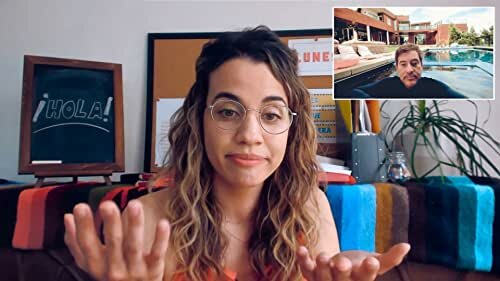The Self and the Stranger: A Review of Language Lessons
Written by Kennedy McCutchen
Adam Duplass in Language Lessons Photo Credit: IMDB
It was only fitting that I took a friend I met on Bumble BFF to see a movie portraying the formation of an unconventional, technologically-dependent relationship. As we rode the subway into Brooklyn, we filled our would-be silences with lively and meaningful discussion about our favorite films, our romantic relationships, and our shared appreciation for learning. There were, as always, moments of vulnerability: some in an effort to keep the conversation alive, others to reveal ever-becoming parts of ourselves - our fears, ambitions, and turmoils - to demonstrate the authentic trust we were attempting to build with each other. We never really know the inner life of the stranger, however long we have known and loved said person, but we can make the valiant and potentially transcendental effort to try. And, not once, did we discuss our phones, friendship-meeting apps, or any other technological mechanism of communication. Nor do Cariño (Natalie Morales) and Adam (Mark Duplass) in Language Lessons.
Zoom feels quite camouflaged throughout the movie, though it is the only way we, as viewers, are able to see Morales and Duplass on screen together. It is never a point of discussion; it is simply a tool (an increasingly crucial one at that) to facilitate human exchange. The more contingent aspect of the film, and perhaps in our lives altogether, is the liminal relational space between two separate people, the self and the stranger, and the subsequent evolution of knowing, understanding, and loving.
Natalie Morales and Adam Duplass in Language Lessons Photo Credit: IMDB
Cariño and Adam’s platonic meet cute is predicated on Adam’s husband, Will, surprising Adam with one-hundred Spanish lessons taught by Cariño, who is based in Costa Rica. Their initial meeting, interrupted infrequently by internet glitches (that are surprisingly artful on film), is one of immediate kinship. Their bilingual banter exudes warmth and familiarity; while Cariño is certainly more reserved than her boisterous and chatty student, they meet one another with kind listening ears. The interplay of multiple languages, too, both emphasizes and marries their distinct personalities into a relationship that I and my friend found immediately compelling.
Like most relationships, however, tragedies and misunderstandings impede upon the pair’s closeness. Cariño consoles Adam in a time of loss. Cariño and Adam get closer, exchanging witty, humorous videos that reveal more of themselves and their personalities. Adam begins to assume Cariño is hiding a secret that keeps her in danger. Cariño lashes back at Adam, claiming he knows nothing about her. Adam beseeches Cariño to let him into her life. The art of conversation, the dance of getting to know one another continues.
I don’t state these plot points trivially. I state them so bluntly to emphasize how true-to-life Morales and Duplass kept their script, how effortlessly Morales’ direction captured a kind of immediacy and relatability which permitted us to see ourselves in these characters and honestly parallel the exchanges I have with the people I interact with on a daily basis. Whether it be the friendly Trader Joe’s grocer asking me if I found all that I needed on an isolated Thursday evening, or the mother I call when I’m feeling lost and overwhelmed, or the partner I both turn to and retreat from when I feel misunderstood and alone, all of my interactions are inevitable contestations that require choice in presentation, authenticity, and character, none of which are easy to determine. I can viscerally remember the last time I claimed to someone that they didn’t really know me, didn’t really understand what I was going through, not necessarily because they psychologically and pragmatically could not, but because I wanted to evade vulnerability and resist the other’s (or, in Lacanian and Camuian fashion, “The Other’s” or “The Stranger’s”) gaze that reflected what I was most avoidant of in myself.
Official poster for Language Lessons




